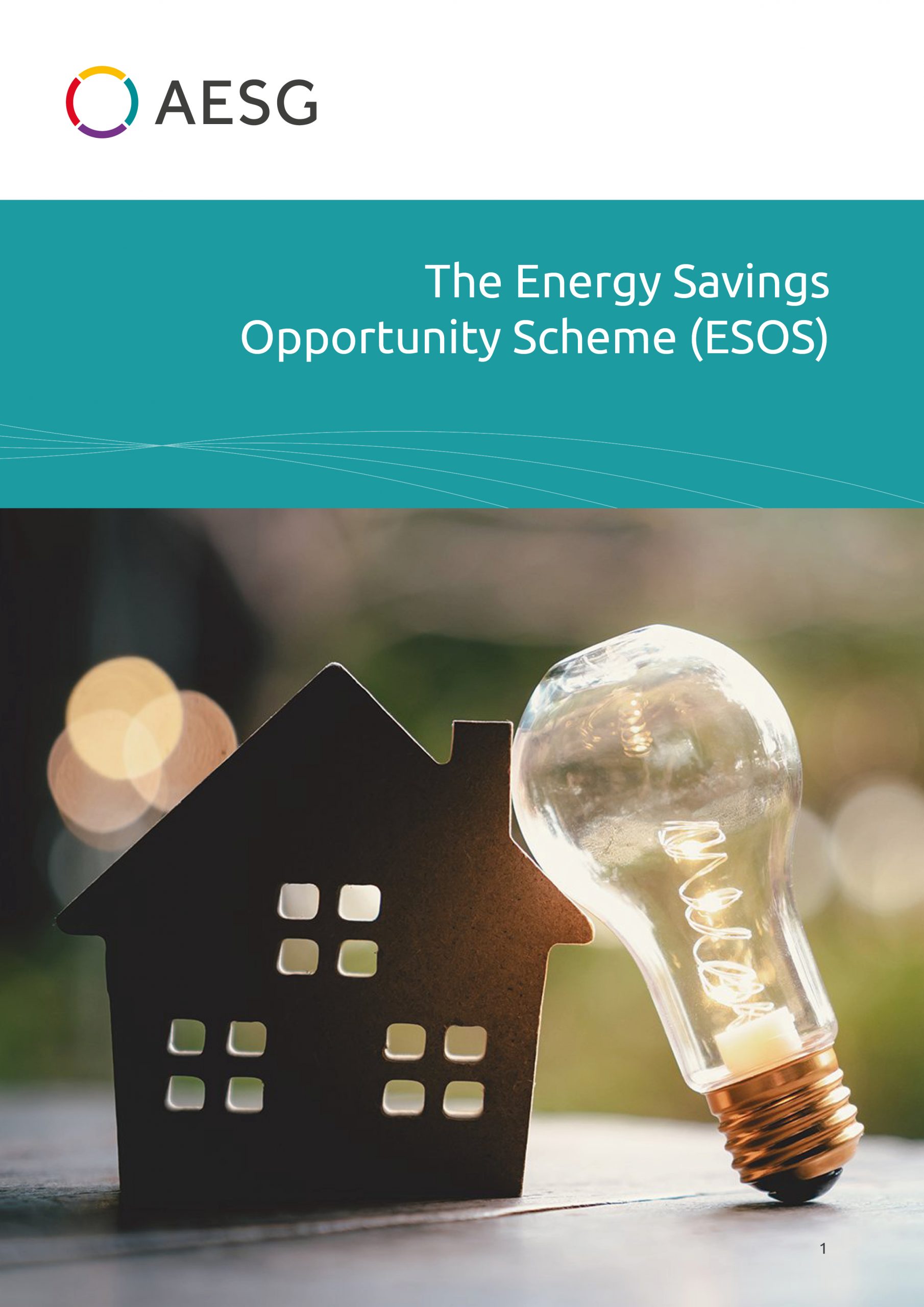
1. Introduction
The Energy Savings Opportunity Scheme (ESOS) is a mandatory energy assessment scheme introduced by the UK government to ensure that large organisations are taking steps towards improving their energy efficiency. We are currently in Phase 3 of the Scheme, whereby organisations that meet the qualification criteria must audit and report at least 95% of their energy usage (including that consumed by buildings, industrial processes, and transport) to the Environmental Agency every 4 years. The next compliance deadline is on the 5th of December 2023, which means that organisations must start preparing.
2. Phases and Deadlines
ESOS has 4 phases (or stages) and deadlines for submission. Each phase has a qualification date (when a company must assess whether they qualify) and a compliance deadline (by which an organization must be compliant). The phases and important dates are outlined below.

3. Updates to the ESOS Regulations
ESOS regulations have been under consultation, and the government released detailed changes for phase 3 and 4 on the 28th of July 2022.
The proposals to be adopted in Phase 3 on a mandatory basis are set out in the government response to the consultation and aim to be in place ahead of the compliance date on the 5th of December 2023. These include the following updates:
The document also sets out a summary of feedback received on 2 further options which will inform developments in future phases:
For Phase 4, BEIS are looking to increase the number of organisations required to report and refocus the ESOS scheme to cover both energy efficiency and net zero. The following changes will be applied to Phase 4:
In addition, they intend to work with the British Standards Institute (BSI) which is the UK’s national standards body (NSB) to produce a Publicly Available Specification (PAS) which lays out the requirements for carrying out an energy and net zero assessment, in addition to revising the existing PAS 51215:2014 with additional net zero requirements for assessors.
BSI launched a public consultation on the two draft PAS 51215-1 and PAS 51215-2 standards, that ran from the 6th of February to 20th March 2023, beyond which we wait for the government to respond and confirm further changes. Considering these updates, ESOS participants may decide to include a net zero aspect to ESOS in phase 3 on a voluntary basis.
4. When to Start
The next compliance deadline is on the 5th December 2023, which means that organisations must start preparing now. The date you use as the basis for Phase 3 should be based on a 12-month period that includes the qualification date (31st of December 2022) and ends before the compliance date (5th of December 2023). This is known as the reference period. The earliest it could start is 1st of January 2022 and the latest it can end is the 4th of December 2023. Any consecutive 12 months within this timespan must be reported.
5. Risks of Non-Compliance
Whilst the Environmental Agency have been somewhat lenient in Phases 1 and 2, they have indicated that the stringency will increase in Phase 3, with fines up to £90,000 for non-compliance.
6. Step-by-Step ESOS Guidance
The following steps are required to complete the ESOS assessment, and are further outlined in detail below:
6.1 Qualification Criteria
ESOS is mandatory for large (non-SME) enterprises and their corporate groups. Whilst it mainly affects businesses, it can also apply to not-for-profit bodies and other non-public sector undertakings. It is currently applicable to all organisations that, on/from the 31st of December 2022, comply with one or more of the following:
Organisations that comply with the above criteria and are fully covered by ISO 50001, where the certification is valid at the compliance date, and energy management systems cover all assets held and activities carried out by the organisation, an ESOS assessment does not need to be carried out, but the Environmental Agency must be notified.
If the organization qualified in ESOS Phase 2, but does not meet the criteria for Phase 3 on the qualification date, you must submit a DNQ (Do Not Qualify) notification to the Environmental Agency.
6.2. Appoint a Lead ESOS Assessor
A lead assessor must be appointed to carry out and oversee or review the energy audits and ESOS assessment, unless:
The lead assessor can be an employee, or external contractor as long as they are members of an approved professional body register. It is important to get the lead assessor on board as soon as possible, as the closer you get to the compliance deadline, the higher their demand. You must specify who your lead assessor is when notifying the Environmental Agency that you comply with ESOS.
6.3. Identify your Total Energy Consumption
All energy must be identified and reported. Energy may include combustible fuels, heat, renewable energy, electricity, and fuels used in transport. There are no fuel type exemptions in ESOS. Therefore, all energy consumed by buildings, industrial processes, transport, and construction activities must be identified. These should be reported in a common unit such as kWh or £ spent.
6.4. Identify your Significant Energy Consumption
This is energy used by assets, or activities carried out that account for at least 95% of the total energy consumption. This means that you can exclude up to 5% of your total energy consumption from audit measures (your 5% ‘de minimis energy consumption’), however you may prefer to include 100% of total energy consumption. The organisation must find out whether ISO 50001, DECs or GFAs cover any of the areas of significant energy consumption and whether ESOS compliant energy audits have been carried out for these areas not covered by these. You can use a mix of approaches.
6.5. Identify Areas for Improvement
Your ESOS energy audit must include recommendations for cost-effective energy efficiency improvements in all aspects of energy consumption and should calculate how much could be saved. The following may be included in the recommendations:
Costs and benefits of these measures must be included. For cost-benefit analyses, an ESOS energy audit should use life-cycle cost analysis (LCCA) instead of a simple payback period.
The purpose of ESOS is to encourage energy-savings that will ultimately benefit organisations by reducing costs as well as carbon. It is therefore urged that organisations make the most of this opportunity, and use the Energy Bill Relief Scheme to invest in energy efficiency measures to reduce consumption.
6.6. Carry out an Audit
The organisation must then carry out an audit on the significant energy consumption meanwhile identifying energy saving opportunities.
6.7. Get the report signed off by the directors
Having completed the ESOS assessment, board level directs from one of the undertakings in the participant group need to confirm that they:
If the lead assessor is external, one director will need to provide this confirmation in writing. Where your lead assessor is internal, two directors need to provide this confirmation in writing.
6.8. Notify the Environment Agency
Notifications of compliance need to be submitted to the Environmental Agency to prove compliance with obligations. You do not need to create an account or log in, and there is no charge for submitting.
6.9. Keep Records
Records of compliance must be kept in an evidence pack. This must contain evidence, calculations, and confirmation from all the above requirements. The evidence pack must be kept for the compliance period to which is relates, and the two subsequent compliance periods.
How can AESG help?
AESG is a specialist consultancy, engineering and advisory firm headquartered in London, Dubai, Riyadh and Singapore working on projects throughout Europe, Asia and Middle East. We pride ourselves as industry leaders in each of the services that we offer. We have one of the largest dedicated teams with decades of cumulative experience in sustainable design, fire and life safety, façade engineering, commissioning, data management for the built environment, waste management, environmental consultancy, acoustics, strategy and advisory and carbon management.

Sustainability Consultant, AESG
Sofi is a dynamic Sustainability Consultant with a demonstrated history of consulting internationally recognised organisations on net zero carbon and sustainability certifications. Her professional experience and academic background have given her a deep and holistic understanding of energy, technology, and climate regulations. Coupled with her non-domestic energy assessor (NDEA) qualification and modelling expertise, she conducts complex analyses on building performance and carbon footprint. Sofi works closely with her clients to deliver successful decarbonisation strategies and net zero roadmaps.
Having completed courses in multiple aspects of Sustainable Building Design, she has managed projects to achieve Net-Zero, WELL, LEED, BREEAM, Estidama and GSAS certifications. Her interest in health and wellbeing in buildings provides an additional quality to the work she produces.
For further information relating to specialist consultancy engineering services, feel free to contact us
References
2EA, 2023, BEIS Update – ESOS Phase 3 & 4 – Changes to PAS 51215 [online] Available at: https://2ea.co.uk/beis-update-esos-phase-3-4-changes-to-pas-51215/
Advantage Utilities, nd, Energy Saving Opportunities Scheme [online] Available at: https://www.advantageutilities.com/energy-savings-opportunities-
BSI, 2023, Energy and net zero assessment – Process – Specification [online] Available at: https://standardsdevelopment.bsigroup.com/projects/2022-01777#/section
BSI, 2023, Energy and net zero assessment – Competencies of lead assessors and assessment teams [online] Available at: https://standardsdevelopment.bsigroup.com/projects/2022-01777#/section
Carbon Trust, 2023, ESOS Compliance [online] Available at: https://www.carbontrust.com/environmental-reporting-and-disclosure/esos-compliance
Concept Energy Solutions, 2023, ESOS is being strengthened: Concept’s quick guide [online] Available at: https://conceptenergy.org/esos-is-being-strengthened-concepts-quick-guide/
Energy Advice Hub, 2022, Energy Planning: Beyond the Energy Bill Relief Scheme [online] Available at: https://energyadvicehub.org/energy-planning-beyond-the-energy-bill-relief-scheme/
Energy Advice Hub, 2023, ESOS phase 3: what you need to know [online] Available at: https://energyadvicehub.org/esos-phase-3-what-you-need-to-know/
Gov.uk & Environmental Agency, 2021, Comply with the Energy Savings Opportunity Scheme [online] Available at: https://www.gov.uk/government/publications/comply-with-the-energy-savings-opportunity-scheme-esos/complying-with-the-energy-savings-opportunity-scheme-esos
Gov.uk, 2023, Energy Bill Relief Scheme: help for businesses and other non-domestic customers [online] Available at: https://www.gov.uk/guidance/energy-bill-relief-scheme-help-for-businesses-and-other-non-domestic-customers
Gov.uk, 2022, Energy Savings Opportunity Scheme [online] Available at: https://www.gov.uk/guidance/energy-savings-opportunity-scheme-esos
Gov.uk, 2022, Strengthening the Energy Savings Opportunity Scheme (ESOS) [online] Available up: https://www.gov.uk/government/consultations/strengthening-the-energy-savings-opportunity-scheme-esos